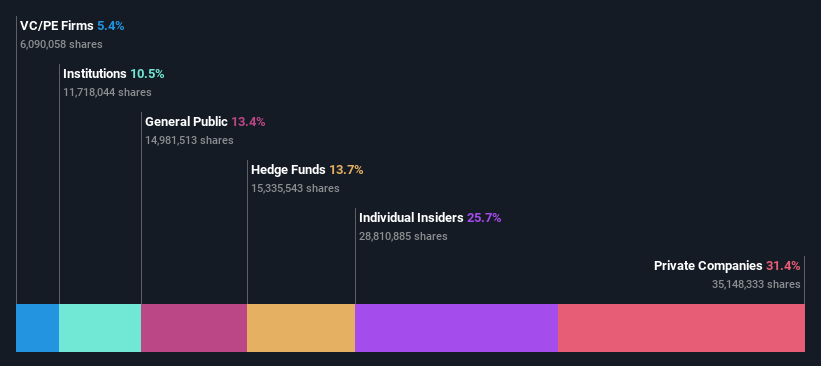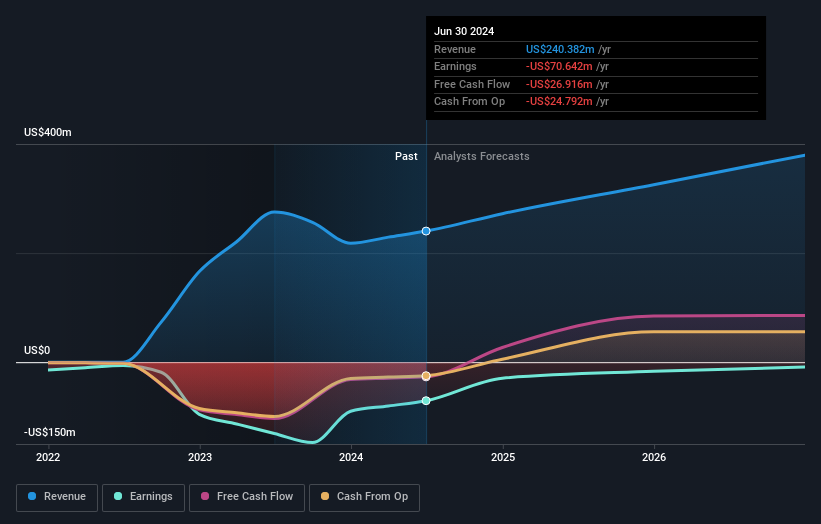- United States
- /
- Personal Products
- /
- NasdaqCM:WALD
Private companies invested in Waldencast plc (NASDAQ:WALD) up 10% last week, insiders too were rewarded

Key Insights
- Waldencast's significant private companies ownership suggests that the key decisions are influenced by shareholders from the larger public
- 55% of the business is held by the top 3 shareholders
- Insiders own 26% of Waldencast
Every investor in Waldencast plc (NASDAQ:WALD) should be aware of the most powerful shareholder groups. We can see that private companies own the lion's share in the company with 31% ownership. Put another way, the group faces the maximum upside potential (or downside risk).
Following a 10% increase in the stock price last week, private companies profited the most, but insiders who own 26% stock also stood to gain from the increase.
In the chart below, we zoom in on the different ownership groups of Waldencast.
View our latest analysis for Waldencast

What Does The Institutional Ownership Tell Us About Waldencast?
Many institutions measure their performance against an index that approximates the local market. So they usually pay more attention to companies that are included in major indices.
We can see that Waldencast does have institutional investors; and they hold a good portion of the company's stock. This suggests some credibility amongst professional investors. But we can't rely on that fact alone since institutions make bad investments sometimes, just like everyone does. It is not uncommon to see a big share price drop if two large institutional investors try to sell out of a stock at the same time. So it is worth checking the past earnings trajectory of Waldencast, (below). Of course, keep in mind that there are other factors to consider, too.

Our data indicates that hedge funds own 14% of Waldencast. That catches my attention because hedge funds sometimes try to influence management, or bring about changes that will create near term value for shareholders. The company's largest shareholder is Sijue Dai, with ownership of 26%. In comparison, the second and third largest shareholders hold about 15% and 14% of the stock.
To make our study more interesting, we found that the top 3 shareholders have a majority ownership in the company, meaning that they are powerful enough to influence the decisions of the company.
While it makes sense to study institutional ownership data for a company, it also makes sense to study analyst sentiments to know which way the wind is blowing. There are plenty of analysts covering the stock, so it might be worth seeing what they are forecasting, too.
Insider Ownership Of Waldencast
The definition of company insiders can be subjective and does vary between jurisdictions. Our data reflects individual insiders, capturing board members at the very least. The company management answer to the board and the latter should represent the interests of shareholders. Notably, sometimes top-level managers are on the board themselves.
Insider ownership is positive when it signals leadership are thinking like the true owners of the company. However, high insider ownership can also give immense power to a small group within the company. This can be negative in some circumstances.
Our most recent data indicates that insiders own a reasonable proportion of Waldencast plc. Insiders own US$127m worth of shares in the US$493m company. This may suggest that the founders still own a lot of shares. You can click here to see if they have been buying or selling.
General Public Ownership
The general public, who are usually individual investors, hold a 13% stake in Waldencast. This size of ownership, while considerable, may not be enough to change company policy if the decision is not in sync with other large shareholders.
Private Equity Ownership
With a stake of 5.4%, private equity firms could influence the Waldencast board. Some might like this, because private equity are sometimes activists who hold management accountable. But other times, private equity is selling out, having taking the company public.
Private Company Ownership
We can see that Private Companies own 31%, of the shares on issue. It's hard to draw any conclusions from this fact alone, so its worth looking into who owns those private companies. Sometimes insiders or other related parties have an interest in shares in a public company through a separate private company.
Next Steps:
While it is well worth considering the different groups that own a company, there are other factors that are even more important. To that end, you should be aware of the 2 warning signs we've spotted with Waldencast .
But ultimately it is the future, not the past, that will determine how well the owners of this business will do. Therefore we think it advisable to take a look at this free report showing whether analysts are predicting a brighter future.
NB: Figures in this article are calculated using data from the last twelve months, which refer to the 12-month period ending on the last date of the month the financial statement is dated. This may not be consistent with full year annual report figures.
Valuation is complex, but we're here to simplify it.
Discover if Waldencast might be undervalued or overvalued with our detailed analysis, featuring fair value estimates, potential risks, dividends, insider trades, and its financial condition.
Access Free AnalysisHave feedback on this article? Concerned about the content? Get in touch with us directly. Alternatively, email editorial-team (at) simplywallst.com.
This article by Simply Wall St is general in nature. We provide commentary based on historical data and analyst forecasts only using an unbiased methodology and our articles are not intended to be financial advice. It does not constitute a recommendation to buy or sell any stock, and does not take account of your objectives, or your financial situation. We aim to bring you long-term focused analysis driven by fundamental data. Note that our analysis may not factor in the latest price-sensitive company announcements or qualitative material. Simply Wall St has no position in any stocks mentioned.
About NasdaqCM:WALD
Waldencast
Operates in the beauty and wellness industry in the United States, Canada, Europe, the Middle East, India, Australia, and New Zealand.
Fair value with mediocre balance sheet.
Similar Companies
Market Insights
Community Narratives



